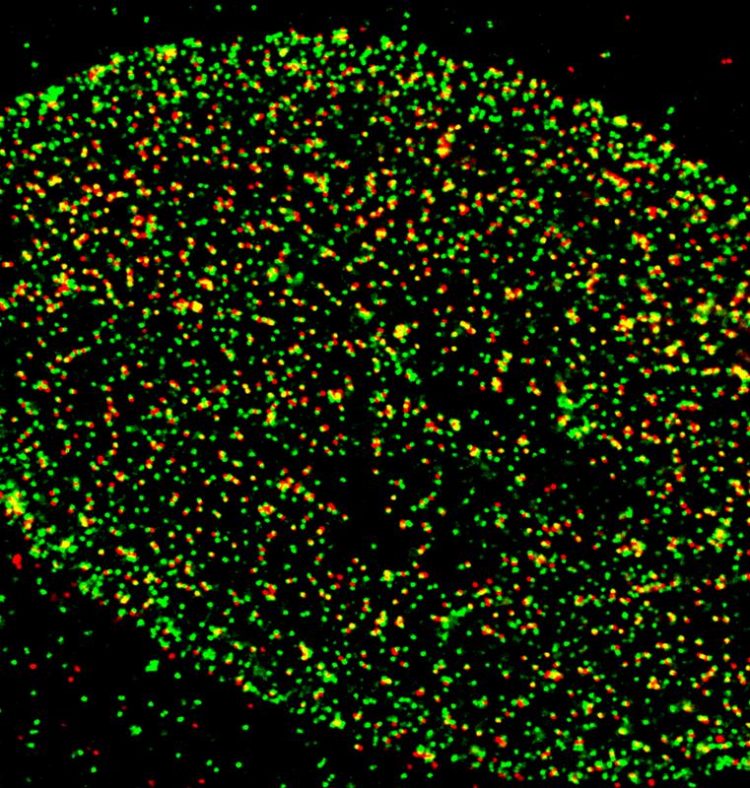Newly Discovered Protein Gives Signal for Virus Infection

Without the signal to uncoat their DNA, the adenoviruses (red) are stopped at the nuclear pore complexes of the human cell (green). Michael Bauer, University of Zurich
Viruses have been part of animals and humans for eons. When viruses invade a cell, they can infiltrate the nucleus with their genome and become part of the genome of the infected organism.
Viruses transfer their genes between various organisms, as well as between tissues containing well differentiated cells inside a living creature. But how they uncoat their well-packed genes and release them to cause infection is largely unknown.
Mib1 protein systematically controls virus infection
The research group of Urs Greber, professor at the Institute of Molecular Life Sciences of the University of Zurich (UZH), has now for the first time identified a protein in human cells that is key for successful viral DNA uncoating: the ubiquitin-ligase Mind bomb 1 (Mib1).
“The protein enables adenoviruses to uncoat their DNA and discharge it into the nucleus – which is necessary for successful infection,” says Greber. If the protein is not produced or fails to work properly, the viruses can penetrate into the cell and reach the nuclear membrane, but they remain stuck on the porous structures of the nuclear envelope.
“This finding opens up a new possibility for developing anti-viral therapies that block Mib1 in well differentiated cells,” says Greber. At present, there are no effective drugs to combat these widespread viruses.
Looking for door handle at nucleus entrance
Researchers found the protein by switching off most of the genes in human cells of the lung epithelium using RNA interference one by one, and then testing whether adenoviruses could infect the cells.
“When we inhibited the gene for Mib1 or knocked it out using CRISPR-Cas technology, the virus infection rate declined drastically. Practically all adenoviruses remained stuck at the pore structures outside of the nucleus,” says Greber. As soon as these cells, after genetic interventions, produced small amounts of Mib1 again, the Mib1 reached the viruses at the nuclear pores, and the viruses uncoated their genes and infected the cells.
Adenoviruses: Life-threatening for people with weakened immune systems
Adenoviruses are widespread in humans and many animals. In humans, they can cause infections in the respiratory system and the gastrointestinal tract, as well as the kidney, liver, eyes and blood cells.
For healthy people, the viruses are not life-threatening – the viruses simply settle in immune cells, where they remain for months without damaging the cells or tissue. In a person with a weakened immune system, however – for example stem-cell or organ transplant recipients – adenoviruses can easily spread to other cells and become life-threatening.
Prof. Dr. Urs Greber
Institute of Molecular Life Sciences
University of Zurich
Phone +41 44 635 48 41
E-mail: urs.greber@imls.uzh.ch
Michael Bauer, Justin W. Flatt, Daria Seiler, Bettina Cardel, Mario Emmenlauer, Karin Boucke, Maarit Suomalainen, Silvio Hemmi, and Urs F. Greber. The E3 Ubiquitin Ligase Mind Bomb 1 Controls Adenovirus Genome Release at the Nuclear Pore Complex. Cell Reports. 17 December 2019. DOI: 10.1016/j.celrep.2019.11.064
https://www.media.uzh.ch/en/Press-Releases/2019/Virus-Infection.html
Media Contact
All latest news from the category: Life Sciences and Chemistry
Articles and reports from the Life Sciences and chemistry area deal with applied and basic research into modern biology, chemistry and human medicine.
Valuable information can be found on a range of life sciences fields including bacteriology, biochemistry, bionics, bioinformatics, biophysics, biotechnology, genetics, geobotany, human biology, marine biology, microbiology, molecular biology, cellular biology, zoology, bioinorganic chemistry, microchemistry and environmental chemistry.
Newest articles

First-of-its-kind study uses remote sensing to monitor plastic debris in rivers and lakes
Remote sensing creates a cost-effective solution to monitoring plastic pollution. A first-of-its-kind study from researchers at the University of Minnesota Twin Cities shows how remote sensing can help monitor and…

Laser-based artificial neuron mimics nerve cell functions at lightning speed
With a processing speed a billion times faster than nature, chip-based laser neuron could help advance AI tasks such as pattern recognition and sequence prediction. Researchers have developed a laser-based…

Optimising the processing of plastic waste
Just one look in the yellow bin reveals a colourful jumble of different types of plastic. However, the purer and more uniform plastic waste is, the easier it is to…



